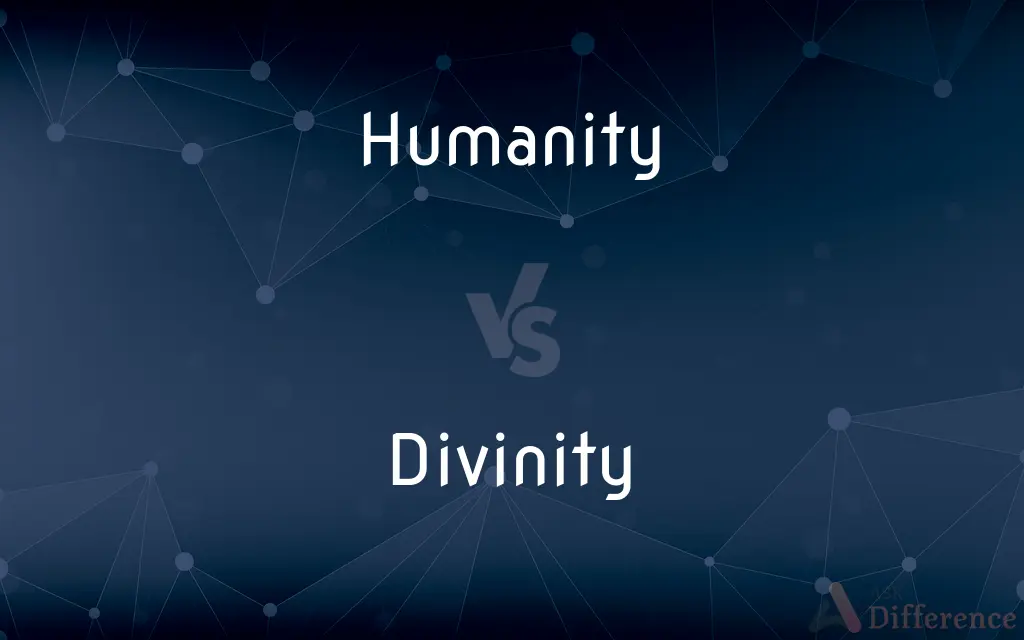Humanity vs. Divinity — What's the Difference?
By Urooj Arif & Fiza Rafique — Updated on April 24, 2024
Humanity refers to the qualities, experiences, and existence associated with being human, often emphasizing compassion and social values; divinity pertains to the nature of deities, focusing on aspects of the sacred, supernatural, and perfection.

Difference Between Humanity and Divinity
Table of Contents
ADVERTISEMENT
Key Differences
Humanity encompasses all aspects of being human, including physical, emotional, and social dimensions. It emphasizes qualities like empathy, cultural achievements, and moral struggles. Conversely, divinity deals with qualities attributed to gods or supreme beings, involving concepts like immortality, omnipotence, and spiritual perfection.
While humanity is characterized by its limitations, imperfections, and mortality, divinity is often associated with infinite capabilities, eternal existence, and flawless nature. This juxtaposition highlights the vast differences in power and scope between human beings and deities.
In philosophical and theological discussions, humanity often represents the common experiences and vulnerabilities shared by all humans, such as suffering and the pursuit of happiness. On the other hand, divinity is considered the source of ultimate truth, morality, and cosmic order, transcending ordinary human experiences.
Art and literature explore humanity by reflecting on the human condition, emotions, and social interactions. In contrast, they portray divinity through themes of miracles, divine intervention, and the quest for spiritual enlightenment, emphasizing a higher state of being beyond the human realm.
The ethical implications of humanity versus divinity can influence societal norms and personal values. Human laws and ethics are shaped by societal consensus and practical realities, whereas divine laws are often seen as absolute and derived from religious doctrines, guiding followers towards a spiritual ideal.
ADVERTISEMENT
Comparison Chart
Definition
Qualities and experiences of being human.
Attributes and nature of gods or supreme beings.
Focus
Empathy, moral struggles, social values.
Sacredness, supernatural powers, perfection.
Characteristics
Mortality, imperfection, physical existence.
Immortality, omnipotence, spiritual existence.
Representation in Arts
Human condition, emotions, social interactions.
Miracles, divine intervention, enlightenment.
Influence on Ethics
Shaped by societal consensus, practical realities.
Guided by absolute, often religious doctrines.
Compare with Definitions
Humanity
The collective human race or condition.
Advances in technology should serve all of humanity.
Divinity
The state or quality of being divine, like a god.
Ancient cultures often attributed storms to the divinity of thunder gods.
Humanity
The state of being human, including vulnerabilities.
The novel explores the depths of humanity in crisis.
Divinity
A deity or god.
Followers offered prayers to the divinity for protection.
Humanity
Compassion or benevolence towards others.
His act of generosity restored my faith in humanity.
Divinity
Attributes associated with being godlike.
The saint was revered for his apparent divinity.
Humanity
Social, cultural, and moral achievements of humans.
The museum exhibits the heights of humanity’s artistic accomplishments.
Divinity
The nature or essence of God.
Mystics seek a direct experience of divinity.
Humanity
Qualities or attributes regarded as human.
She showed great humanity in caring for the injured.
Divinity
The study of religious or theological matters.
She pursued a degree in Divinity to better understand spiritual texts.
Humanity
Humans considered as a group; the human race.
Divinity
Divinity or the divine are things that are either related to, devoted to, or proceeding from a deity. What is or is not divine may be loosely defined, as it is used by different belief systems.
Humanity
The condition or quality of being human.
Divinity
The state or quality of being divine.
Humanity
The quality of being humane; benevolence.
Divinity
Divinity The godhead; God. Used with the.
Humanity
A humane characteristic, attribute, or act.
Divinity
A deity, such as a god or goddess.
Humanity
The languages and literatures of ancient Greece and Rome; the classics.
Divinity
Godlike character.
Humanity
Those branches of knowledge, such as philosophy, literature, and art, that are concerned with human thought and culture.
Divinity
Theology.
Humanity
; human beings as a group.
Divinity
A soft white candy, usually containing nuts.
Humanity
The human condition or nature.
Divinity
(uncountable) The state, position, or fact of being a god or God. [from 14th c.]
Humanity
The quality of being benevolent; humane traits of character; humane qualities or aspects.
Divinity
(countable) deity.
You may leave out where you live and use either initials or an alias, since gods, buddhas and other divinities look only at our hearts.
Humanity
Any academic subject belonging to the humanities.
Philosophy is a humanity while psychology is a science.
Divinity
A celestial being inferior to a supreme God but superior to man.
Humanity
The quality of being human; the peculiar nature of man, by which he is distinguished from other beings.
Divinity
(uncountable) The study of religion or religions.
Harvard Divinity School has been teaching theology since 1636.
Humanity
Mankind collectively; the human race.
But hearing oftentimesThe still, and music humanity.
It is a debt we owe to humanity.
Divinity
A type of confectionery made with egg whites, corn syrup, and white sugar.
Humanity
The quality of being humane; the kind feelings, dispositions, and sympathies of man; especially, a disposition to relieve persons or animals in distress, and to treat all creatures with kindness and tenderness.
Divinity
The state of being divine; the nature or essence of God; deity; godhead.
When he attributes divinity to other things than God, it is only a divinity by way of participation.
Humanity
Mental cultivation; liberal education; instruction in classical and polite literature.
Polished with humanity and the study of witty science.
Divinity
The Deity; the Supreme Being; God.
This the divinity that within us.
Humanity
The branches of polite or elegant learning; as language, rhetoric, poetry, and the ancient classics; belles-letters.
Divinity
A pretended deity of pagans; a false god.
Beastly divinities, and droves of gods.
Humanity
All of the inhabitants of the earth;
All the world loves a lover
She always used `humankind' because `mankind' seemed to slight the women
Divinity
A celestial being, inferior to the supreme God, but superior to man.
God . . . employing these subservient divinities.
Humanity
The quality of being humane
Divinity
Something divine or superhuman; supernatural power or virtue; something which inspires awe.
They say there is divinity in odd numbers.
There's such divinity doth hedge a king.
Humanity
The quality of being human;
He feared the speedy decline of all manhood
Divinity
The science of divine things; the science which treats of God, his laws and moral government, and the way of salvation; theology.
Divinity is essentially the first of the professions.
Divinity
Any supernatural being worshipped as controlling some part of the world or some aspect of life or who is the personification of a force
Divinity
The quality of being divine;
Ancient Egyptians believed in the divinity of the Pharaohs
Divinity
White creamy fudge made with egg whites
Divinity
The rational and systematic study of religion and its influences and of the nature of religious truth
Common Curiosities
How does literature typically portray divinity?
Literature often portrays divinity through themes of supernatural intervention, moral authority, and quests for spiritual enlightenment.
What is the essence of humanity?
The essence of humanity includes the collective qualities, experiences, and attributes that define being human, emphasizing physical existence and social interactions.
How is divinity different from humanity?
Divinity pertains to the qualities associated with gods or the divine, such as immortality and perfection, contrasting with humanity’s mortality and imperfection.
What role does humanity play in ethics?
Humanity influences ethics through social values, moral reasoning, and the practical realities of human society.
How do human limitations contrast with divine attributes?
Human limitations include mortality, imperfection, and emotional susceptibility, whereas divine attributes often include immortality, omnipotence, and moral perfection.
What does it mean to study Divinity?
Studying Divinity involves examining religious doctrines, spiritual practices, and theological concepts to understand better and interpret the nature of the divine and its relationship to humanity.
Can humans attain divinity?
In many religious or spiritual beliefs, humans can aspire to divine qualities or closeness to the divine through spiritual practices, though they remain fundamentally human.
Is divinity always associated with religious beliefs?
While commonly associated with religious beliefs, divinity can also be discussed in philosophical or metaphysical contexts outside of traditional religions.
How do humanity and divinity coexist in society?
In society, humanity and divinity coexist through cultural practices, religious institutions, and ethical systems that reflect human interpretations of divine influence and moral order.
Can divinity influence human actions?
In many cultures, divinity influences human actions through religious teachings, spiritual experiences, and ethical directives believed to be derived from a higher power.
Share Your Discovery

Previous Comparison
Flavourful vs. Flavorful
Next Comparison
Send vs. DispatchAuthor Spotlight
Written by
Urooj ArifUrooj is a skilled content writer at Ask Difference, known for her exceptional ability to simplify complex topics into engaging and informative content. With a passion for research and a flair for clear, concise writing, she consistently delivers articles that resonate with our diverse audience.
Co-written by
Fiza RafiqueFiza Rafique is a skilled content writer at AskDifference.com, where she meticulously refines and enhances written pieces. Drawing from her vast editorial expertise, Fiza ensures clarity, accuracy, and precision in every article. Passionate about language, she continually seeks to elevate the quality of content for readers worldwide.
















































